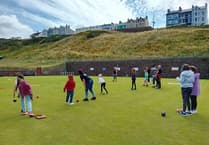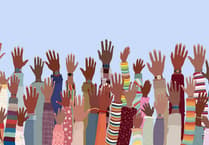Only four years ago, the Isle of Man held its first public pride event at the Villa Marina Gardens in Douglas. It was preceded by a march along Strand Street, with participants carrying a 50-metre rainbow flag.
But long before public partying in the nation’s capital, life for the LGBTQ+ community here looked very different.
Growing Up
Homosexual acts were decriminalised here in 1992 – 25 years later than in England and Wales, and 12 years after Scotland. Before then, same-sex sexual activity was a criminal offence.
So, what was it like growing up at a time when just being yourself was illegal?
Simon Maddrell is a Manx-born poet, writer, and performer. He said wider awareness of what it meant to be gay was something that ‘didn’t really exist’ at the time.
He said: ‘Certainly in my earlier childhood it was images of fun and entertainment for the masses. You had Liberace and John Inman on Are You Being Served? – very camp, effeminate figures. Apart from where we were there to provide the entertainment for people, our existence just wasn’t there.
‘Therefore, one had no reference point. So, the feelings that you have, you have no idea what they mean because you don’t have anything to connect them to.
‘It’s very difficult as a child to reconcile and understand feelings when you’ve got no reference point that these feelings are actually [to do with something] that is real, does exist, other people feel it too.’
Back before decriminalisation, those appearing in court would be reported on in the press, as is the case with anything that is against the law.
Several young men took their own lives during this period, after being arrested or simply outed to their families.
I spoke to Production Hub Lead for Tindle Newspapers – and former editor of this publication – Richard Butt, about court reporting, and how he felt about reports addressing his fellow community.
He said: ‘There are two factors I suppose. In the newspapers, we were able to have opinions in the comment column. And indeed, we did.
‘I’m proud to say that the Examiner, under Lionel Cowin in those days, always said it should be decriminalised in the comment column.
‘In terms of court reporting, it’s a very different situation. We report the courts – we don’t decide the laws. At the moment, we have laws against all sorts of things, [for example in terms of] drugs which I don’t agree with, but we report the courts as they happen, as the laws have been passed by the politicians.
‘At that time the law was that homosexual acts were against the law, and people were prosecuted because of that.’
Protest
On Tynwald Day 5 July 1991, gay rights campaigner Alan Shea caused quite the stir when he exercised his democratic right to present a petition of grievance to the island’s Parliament, in St John's. His petition sought a change in the Manx law relating to the decriminalisation of homosexuality.
He was joined on the day by members of Outrage, a UK-based pressure group, to stage a lawful protest. They brought placards and wore T-shirts with slogans such as: ‘NOT GUILTY’.
In presenting his petition, Alan made a statement. He shaved his head and was clad in a mock concentration camp uniform – consisting of pyjamas (bought from Marks & Spencer in Strand Street) and painted with grey and black stripes.
On either side of his chest, he had a badge quoting gay protest group ACT UP (AIDS Coalition to Unleash Power) stating that the AIDS crisis is not over, and a pink triangle containing the three legs of man (the pink triangle was the symbol used to mark LGBTQ prisoners in the Nazi camps – not dissimilar to the yellow Star of David used to signal Jewish prisoners).
No detail was accidental. Beneath the pink triangle was the number 626262 – the Isle of Man Government phone number at the time.
Alan said: ‘They changed that number after the costume was worn, and they banned outrageous costumes, so no-one can wear a costume [like] this now. But it was to put the focus on homophobia in the Isle of Man and to get [rid of] an outdated law.’
Future
From the outside, it may seem that there’s never been a better time to be part of the LGBTQ+ community. And on a surface level, you would be forgiven for thinking that.
The world is a very different place than it was 50 years ago; or 100 years ago, or even 10 years ago. But that’s not to say there is equality for all, everywhere.
Last year, politicians in Uganda cheered as they passed a new bill making it illegal to identify as LGBT. Anti-drag laws have swept across the United States, and in the UK, the Baroness Casey review found the Metropolitan Police to be institutionally racist, sexist and homophobic.
At the time of writing, simply being gay is illegal in 67 countries around the world – almost half of which are Commonwealth jurisdictions.
It’s punishable by death in 11.
Pride
Given this context, throughout this series, I asked my interviewees the simple question, ‘Do we still need pride?’
The resounding answer was yes.
The island’s first singing drag queen, Vida La Fierce, cited instances of queer rights being revoked around the world.
She said: ‘Anyone who can’t see a reason for Pride is ironically the reason for it. If you've never had to actually fight for equality and fight for your rights, then that is something that is really worth celebrating.
‘Huge progress has been made, but there's still a long way to go. There are still injustices happening on our own doorstep, but also further afield as well. There are so many countries in the world with anti-LGBTQ+ laws, and there are so many that are in the process of making more of them.
‘Some countries seem to be taking backwards steps. You can see what's going on in some states in America at the moment, and that is terrifying.
‘Anyone sitting watching a situation where a country is going backwards in human rights should be terrified, because if you think it's just the gays or the trans people they're coming for - think again.
‘They'll be the first. But then what's to stop them coming for someone else's rights next and someone else’s after that? And if you think it can't happen, you know it can. All it takes is the wrong people in power, and a swish of a pen, and rights can be taken away.’
She added: ‘No rights are guaranteed forever. So even though we’ve won some, they’re not enshrined forever. The wrong person can come across and wipe them out.
‘That should be terrifying to everybody, because an attack on any group's human rights, is an attack on all of our human rights.
‘The fact that some countries are taking backward steps should scare everybody, because it could be you next.’
This extract is taken from a series of special radio programmes produced by Siobhán Fletcher. You can find all five episodes of ‘A Brief History of Pride’ at ManxRadio.com




